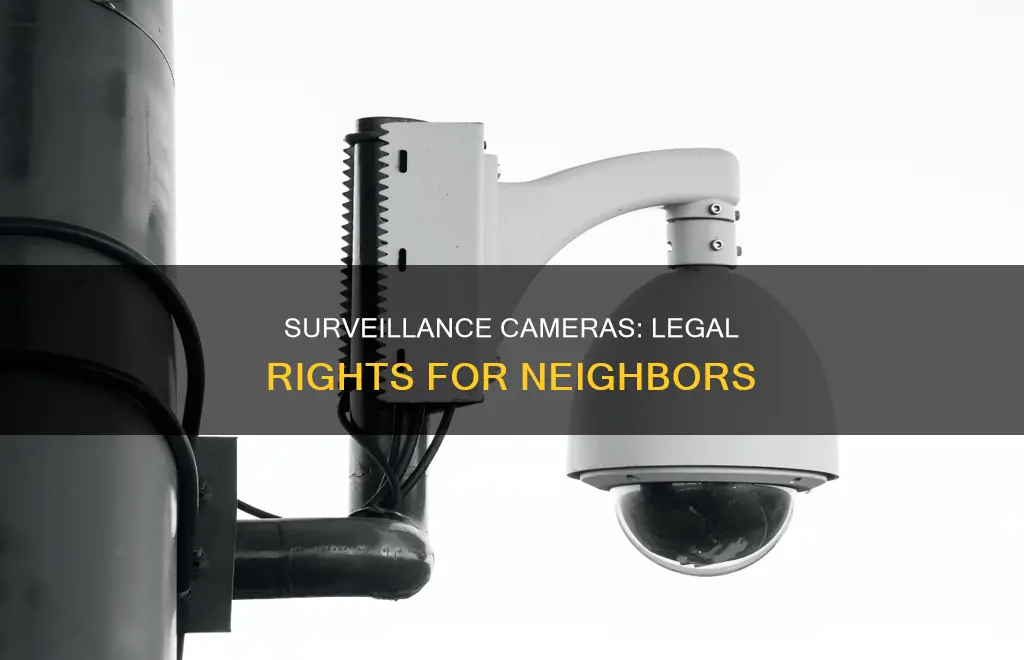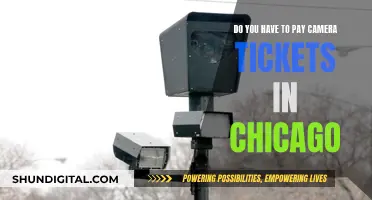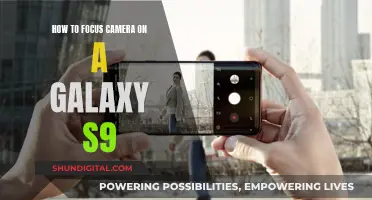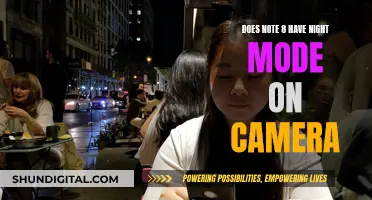
The use of surveillance cameras by neighbours is a contentious issue that can lead to disputes over privacy. While it is generally legal for individuals to have surveillance cameras on their property, there are boundaries in terms of invading someone's privacy. The specific laws vary by state and country, but there are some common principles to consider. Firstly, it is important to respect the privacy of neighbours to maintain a harmonious community. Secondly, individuals have a reasonable expectation of privacy in certain areas, such as bedrooms, bathrooms, and changing rooms. Recording these areas without consent can be considered a violation of privacy and may have legal consequences. Thirdly, audio recording laws also vary, with some states requiring the consent of all parties involved in a conversation for it to be recorded legally. Finally, if you are concerned about a neighbour's surveillance camera, it is best to communicate your concerns politely and seek a resolution through dialogue or mediation. Taking illegal actions, such as damaging or tampering with the camera, is not recommended and can lead to legal trouble.
| Characteristics | Values |
|---|---|
| Legality of surveillance cameras | Depends on the law in your state or country |
| Privacy laws | Surveillance cameras are legal in public spaces but not in private spaces where there is an expectation of privacy (e.g. bathrooms, bedrooms) |
| Consent laws | One-party consent laws allow recording with the consent of at least one party; all-party consent laws require the consent of all parties |
| Hidden cameras | Generally allowed if they abide by privacy and consent laws |
| Audio recording | Generally requires consent from at least one side |
| Video recording | Generally legal in public spaces |
What You'll Learn

Legality depends on state law
The legality of surveillance cameras often depends on the laws of the state in which you live. While there are no specific federal laws governing the use of security cameras, there are national consent and privacy laws that apply to video surveillance. There are also regulations for recording audio and video footage.
In most states, it is legal to install security cameras in your home, but there are exceptions. For example, it is illegal to record people in places where they have a reasonable expectation of privacy, such as the bathroom. This is known as the "expectation of privacy" law.
Additionally, each state has different laws regarding consent for recording audio conversations. Some states have a "one-party consent" law, which means that only one person in the conversation needs to consent to the recording. Other states have an "all-party consent" law, which requires the consent of all parties involved.
- Georgia permits the use of video surveillance cameras in public and private settings as long as the cameras are in plain sight.
- Florida, Alabama, and Minnesota allow hidden video surveillance in non-private settings.
- Tennessee, Michigan, and Utah require consent for installing hidden cameras in private places, but not in public places.
- Hawaii requires the consent of those being watched to install security cameras.
- New Hampshire, Maine, Kansas, South Dakota, and Delaware apply the "reasonable expectation of privacy" principle and require consent for hidden camera surveillance.
- California specifically prohibits the video recording of any communication considered confidential, regardless of consent.
It's important to note that the laws regarding surveillance cameras can be complex and may vary not only by state but also by county and city. Therefore, it's always a good idea to check the specific laws and regulations in your area before installing any security cameras.
RAW vs JPEG: Understanding Camera Image Formats
You may want to see also

No expectation of privacy outdoors
In the context of surveillance cameras, the "expectation of privacy" is a key concept that determines the legality of recording in a given space. While the specific laws vary by state and country, the general principle is that individuals have a reasonable expectation of privacy in certain areas, such as their homes, bedrooms, bathrooms, and other private spaces. On the other hand, there is no expectation of privacy in public spaces, and recording through surveillance cameras is generally permitted.
When it comes to your neighbor's surveillance cameras, if they are recording areas outside your home, such as your backyard or driveway, that are visible from public spaces, you typically cannot press charges or claim a violation of privacy. This is because there is no expectation of privacy in these outdoor areas. Your neighbor is entitled to install security cameras on their property to protect their home from burglars or monitor suspicious activities.
However, it is important to note that the use of audio recording may be subject to different laws and require consent from at least one party, depending on the state or country. Additionally, if your neighbor's cameras are recording areas where you have a reasonable expectation of privacy, such as your bedroom or bathroom, it may constitute an invasion of privacy, and you can take legal action.
To address concerns about your neighbor's cameras, it is advisable to first communicate your concerns politely and request that they adjust the camera angle. If this does not resolve the issue, you can consider installing physical barriers, such as trees, fences, or blinds, to block the camera's view. If you still have concerns, you may want to consult an attorney or local law enforcement to understand your specific rights and options.
The Evolution of Camera Manufacturing Origins
You may want to see also

One-party consent laws
The legality of surveillance cameras pointed at a neighbour's property depends on the laws of the state or country in question. In general, it is legal to record video in public, but not in places where there is an expectation of privacy, such as bedrooms, bathrooms, and changing rooms.
In terms of one-party consent laws, these refer specifically to the audio recording of private conversations. One-party consent laws allow for the recording of in-person conversations or phone calls if one of the participants in the conversation gives consent. This means that if you are part of the conversation, you can record it without the knowledge or consent of the other person(s).
There are 37 states (+ Washington D.C.) in the U.S. that are considered one-party consent states:
- Alabama
- Alaska
- Arizona
- Arkansas
- Colorado
- Washington D.C.
- Georgia
- Hawaii
- Idaho
- Indiana
- Iowa
- Kansas
- Kentucky
- Louisiana
- Maine
- Minnesota
- Mississippi
- Missouri
- Nebraska
- Nevada
- New Jersey
- New Mexico
- New York
- North Carolina
- North Dakota
- Ohio
- Oklahoma
- Rhode Island
- South Carolina
- South Dakota
- Tennessee
- Texas
- Utah
- Vermont
- Virginia
- West Virginia
- Wisconsin
- Wyoming
- RecordingLaw.com recommends caution with these states as they have special provisions. Be sure to read the state rules for your specific state.
Vermont does not have an official law related to call recording, so Federal Law applies, making it a one-party consent state.
It is important to note that one-party consent laws do not override a person's expectation of privacy. For example, if you are in a public place with no expectation of privacy, you can be recorded without your consent. However, if you are in a private place, such as your home, you have a reasonable expectation of privacy, and recording you without your consent would likely be illegal.
Additionally, the laws around security cameras and recordings can vary by state and county, so it is essential to check the specific laws in your area.
Charging the Blackmagic Camera: A Step-by-Step Guide
You may want to see also

Video surveillance in private spaces
The use of surveillance cameras in private spaces is a complex issue that depends on local laws, privacy considerations, and the specific circumstances. While it is generally legal for individuals to have surveillance cameras on their property, there are boundaries in terms of invading a person's privacy.
Legality of Surveillance Cameras in Private Spaces
The legality of surveillance cameras in private spaces varies across different states and counties. Here are some examples of state laws regarding the use of surveillance cameras:
- Georgia permits the use of video surveillance cameras in both public and private settings, as long as the cameras are in plain sight.
- Florida, Alabama, and Minnesota allow hidden video surveillance in non-private settings.
- Tennessee, Michigan, and Utah require consent for installing hidden cameras in private places, while no permission is needed for public spaces.
- Hawaii mandates consent from individuals being watched, regardless of the setting.
- New Hampshire, Maine, Kansas, South Dakota, and Delaware apply the "reasonable expectation of privacy" principle, requiring consent for hidden camera surveillance.
- California specifically prohibits making video recordings of confidential communications.
- Arkansas requires consent when recording individuals in private spaces.
Privacy Considerations
Respecting the privacy of individuals is crucial when installing surveillance cameras in private spaces. Here are some general guidelines to consider:
- Avoid placing cameras in areas where individuals have a reasonable expectation of privacy, such as bathrooms, bedrooms, changing rooms, and guest rooms.
- Ensure that the surveillance system is tailored to minimise the impact on privacy. For example, using limited surveillance during specific periods or events instead of continuous monitoring.
- Inform individuals that they are under surveillance through clearly written signs.
- Respect fair information practices when collecting, using, disclosing, retaining, and destroying personal information obtained through video surveillance.
- Avoid aiming cameras at areas with a heightened expectation of privacy, such as windows of buildings, showers, or washrooms.
Dealing with Neighbour's Surveillance Cameras
If you are concerned about a neighbour's surveillance camera pointed at your property, here are some steps you can take:
- Communicate with your neighbour politely and explain your concerns. Request them to adjust the camera angle if possible.
- Consider self-help options like planting trees or installing fences to block the camera's view.
- If the issue persists, consult an attorney or local law enforcement for guidance, especially if you believe your privacy is being invaded or the camera is being misused.
Unlocking Camera's Face Beauty Mode: Enhancing Your Features
You may want to see also

Lawful use of footage
The legality of your neighbour's security camera recording on your property depends on what the camera captures and what your neighbour does with the footage.
As long as the recorded videos don't infringe on your privacy and are for lawful purposes only (like monitoring suspects or preventing package thefts), it is legal for your neighbour to point a security camera at your property in plain view.
However, if your neighbour's security camera captures areas where you have a reasonable expectation of privacy, such as your bathroom, bedroom, or changing room, then it might be illegal. According to residence security camera laws, your neighbour might invite legal trouble if they point security cameras at areas that cannot be viewed without physically entering your premises.
Additionally, if your neighbour misuses the footage, such as posting videos of your activities on social media, it is considered illegal, and you can ask for law enforcement intervention and claim harassment.
Understanding Camera Raw Cache in Lightroom
You may want to see also
Frequently asked questions
Security cameras are legal to own and install in most cases. However, there are laws around privacy and consent that must be considered, and these vary by state.
In most cases, it is legal for a neighbour to point a security camera at your property. However, there are exceptions. If the camera is positioned to record areas where there is a reasonable expectation of privacy, such as your bedroom or bathroom, this may be illegal.
It is recommended that you speak to your neighbour first. They may be unaware that the camera is pointing at your property or that it makes you uncomfortable. Politely ask them to adjust the angle or direction of the camera.
If your neighbour is unwilling to cooperate, you may need to contact the police or a lawyer for assistance. You could also try blocking the camera's view by planting tall trees or shrubs, or installing a fence.
Yes, but it is important to respect your neighbour's privacy. Avoid pointing cameras at windows or into private spaces. Ensure that any footage is for security purposes only and is not shared.







